Police: TV host Jimmy Savile exploited fame to abuse children on vast scale
January 11, 2013 -- Updated 1321 GMT (2121 HKT)
STORY HIGHLIGHTS
- Savile used his celebrity to "hide in plain sight" and targeted the vulnerable, police say
- He is accused of offenses across 40 years while working as a BBC presenter
- Police say 73% of his victims were children; 214 crimes are recorded, including rapes
- Prosecutors say police could have done more to investigate Savile in his lifetime
Nearly three-quarters of
his victims were children, the report said, with the youngest only 8
years old. Most but not all were female.
Since the inquiry was
launched three months ago, about 600 people have come forward to provide
information, 450 relating to Savile, London's Metropolitan Police said.
From this, 214 crimes have been recorded, including 34 of rape or penetration, across the country.
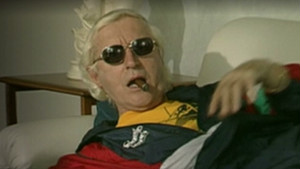 TV icon sex abuse scandal rocks the BBC
TV icon sex abuse scandal rocks the BBC
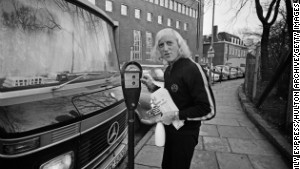 Cops: Savile a predatory sexual offender
Cops: Savile a predatory sexual offender
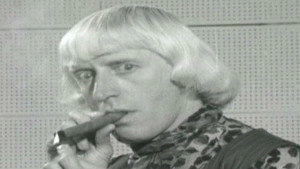 Savile's years of abuse
Savile's years of abuse
 UK PM handed 'pedophile' list on live TV
UK PM handed 'pedophile' list on live TV
The earliest claim
against Savile, who was still a household name when he died in 2011,
dates from 1955 and the latest from 2009.
Savile used his celebrity
to "hide in plain sight" as he opportunistically preyed on the children
and young people with whom he came into contact as he presented BBC
children's show "Jim'll Fix It" and music show "Top of the Pops," the
report said.
Offenses on BBC premises
have been reported across a 40-year span between 1965 and 2006 -- the
last at the final recording of "Top of the Pops."
Savile is accused of
sexual offenses in 14 medical establishments, including hospitals,
mental care institutions and a hospice, the report said. There are also
claims that he abused students at a reform school between 1970 and 1978,
when the entertainer was a regular visitor.
The scale of his abuse is believed to be unprecedented in the UK, it said.
The report by London's
Metropolitan Police and a child protection charity, the NSPCC, titled
"Giving Victims a Voice," brings to a close a sordid chapter.
Police set up Operation
Yewtree to investigate sexual abuse claims after a documentary by
broadcaster ITV in October unleashed a flood of allegations against the
star, who before that was seen as an eccentric but charismatic man who
raised millions of pounds for charity.
The investigation had
three strands: one involving complaints against Savile alone, another
termed "Savile and others" and a third involving only others. The
publication of the report ends the first strand of the inquiry.
However, investigations
continue into allegations made against the other suspects, some linked
to Savile and others not. A number of arrests have been made.
"It paints a stark
picture emphasizing the tragic consequences of when vulnerability and
power collide," Commander Peter Spindler, of the Metropolitan Police,
said of the report.
"Savile's offending
footprint was vast, predatory and opportunistic. He cannot face justice
today but we hope this report gives some comfort to his hundreds of
victims, they have been listened to and taken seriously. We must use the
learning from these shocking events to prevent other children and
vulnerable adults being abused in the future. They will get a voice."
 Fallout continues amid BBC scandal
Fallout continues amid BBC scandal
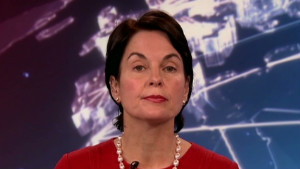 Expert: BBC scandal is a trust issue
Expert: BBC scandal is a trust issue
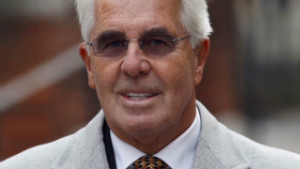 Max Clifford arrested in abuse probe
Max Clifford arrested in abuse probe
 BBC leader quits over false abuse story
BBC leader quits over false abuse story
The BBC, whose reputation has been tainted by the affair, said it would continue to work with police to investigate the claims.
"The police report into
Jimmy Savile contains shocking revelations," a statement said. "As we
have made clear, the BBC is appalled that some of the offences were
committed on its premises. We would like to restate our sincere apology
to the victims of these crimes."
The BBC set up three
inquiries of its own amid questions about how Savile's abuses went
undetected for so long. One is looking at the culture and practices
within the BBC and another at its handling of past sexual harassment
claims.
The third, which
reported on the broadcaster's decision to drop a program investigating
allegations Savile in late 2011, slammed senior management as
"completely incapable" of dealing with the crisis that erupted.
The BBC's botched handling of the affair forced the director general, George Entwistle, to resign.
The UK Department of
Health, which is conducting its own investigation into the access Savile
had to hospitals and other institutions, said the police report
"highlights the shocking scale of offending by Jimmy Savile over five
decades and shows the need to learn lessons from his crimes."
With the police review
concluded, civil claims are likely to be brought as some victims seek
compensation for the abuse they suffered at Savile's hands. About 73% of
them were younger than 18 when they were targeted.
Four-fifths of the victims were girls and women, the report said.
Most of the alleged offenses were committed around the city of Leeds, where Savile lived, and in London, where he worked.
The peak of offending reported to police was between 1966 and 1976, when Savile was between 40 and 50 years old.
Separately, a review by
the Crown Prosecution Service was critical of the decision by two police
forces not to file charges against Savile after investigating four
separate allegations of sexual abuse.
In 2007 and 2008 Surrey
Police investigated three complaints that he had engaged in sexual
behavior with young girls. During the same period, Sussex Police
investigated a complaint by a young woman.
Alison Levitt, chief
legal adviser to the Director of Public Prosecutions, said police were
too cautious in their approach and should have asked more questions to
push inquiries forward.
The alleged victims and
their accounts were treated "with a degree of caution which was neither
justified nor required," she said.
"Having spoken to the
victims I have been driven to conclude that had the police and
prosecutors taken a different approach a prosecution might have been
possible."
Peter Watt, director of child protection advice for the NSPCC, said the scale of Savile's abuse "simply beggared belief."
But, he added, one
positive is that nearly 800 additional children have been protected from
abuse because the publicity around the Savile case has encouraged
people to call the charity's helpline.
For many, it's the first time they've spoken out about abuse, he said.
"We are optimistic that
this signals a watershed moment for child protection in this country. We
must seize the opportunity if we are to make a lasting change," he
said.
The report's authors
acknowledge that it is too late to act on the claims against Savile, but
they say the investigation met "the need for hundreds of victims to
have official recognition of the serious crimes they have suffered and
to know they have been taken seriously."
Millions of Britons who
grew up watching Savile on TV's "Top of the Pops" and "Jim'll Fix It"
were shocked by the fall from grace of an entertainer who'd been awarded
knighthoods by Queen Elizabeth II and the late Pope John Paul II for
his charitable work.
Savile died in October
2011 at age 84, soon after being treated in a hospital for pneumonia.
His death was followed by a series of glowing tributes, including BBC
specials.

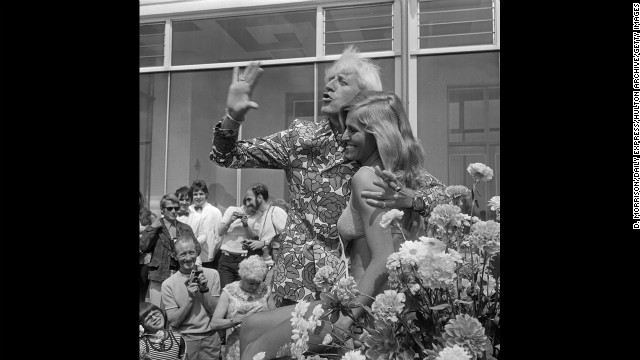 Savile waves with Jersey Holiday Queen Gaynor Lacey at the Jersey Battle of Flowers carnival in 1972.
Savile waves with Jersey Holiday Queen Gaynor Lacey at the Jersey Battle of Flowers carnival in 1972.
ไม่มีความคิดเห็น:
แสดงความคิดเห็น